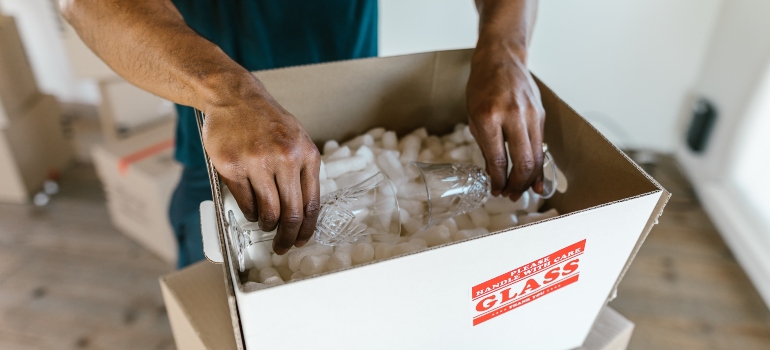Packing a Home Bar: Tips for Safely Transporting Liquor Across State Lines
Creating a home bar is an exciting endeavor that adds a touch of elegance to your space. Efficiently packing a home bar involves careful organization and selection. From glassware to spirits, each element plays a pivotal role and has to be treated with the same level of consideration. Best Cross Country Movers will guide you through the essential steps of packing your bar at home, ensuring that your favorite drinks and tools are readily available while maximizing both style and functionality.
Understanding Legal Considerations
Researching state-specific laws and regulations is the first step in packing a home bar. Each U.S. state has its regulations regarding the importation of alcohol for personal use. Generally, if you’re relocating and wish to bring your home bar collection with you, it’s essential to check the destination state’s alcohol control board or commission for specific guidelines. Some states may impose limits on the amount of alcohol you can bring without a permit, or they may prohibit the transportation of certain types of alcoholic beverages altogether. For instance, in Pennsylvania, residents returning from out-of-state are limited to one gallon of liquor or wine without paying taxes.

In addition to that, remember that it’s illegal to transport alcohol into any U.S. state if you’re under 21. As an example, if someone is moving from Colorado to California and wishes to bring their home bar collection, they should consult California’s Department of Alcoholic Beverage Control to ensure they are in compliance with the state’s regulations. Failing to adhere to these laws could result in fines, confiscation of the alcohol, or other legal ramifications.
Recommended Packing Materials
First of all, you’ll need sturdy cardboard boxes, ensuring they’re the right size to prevent shifting. Use cushioning materials like bubble wrap, packing paper, or foam inserts to protect items from impact. You can also be eco-friendly when packing your home bar, so consider alternatives like using blankets, towels, or clothing as padding. Opt for reusable plastic bins or biodegradable packing peanuts. Finally, for glass items like bottles, get ahold of specialized sleeves for added protection during transit.
Safely Packing Liquor Bottles
To securely pack liquor bottles and prevent breakage, follow these steps. First, wrap each bottle in bubble wrap, providing a cushioning layer. Next, encase the wrapped bottle in packing paper to add an extra layer of protection. Place the bottle in a specialized bottle sleeve, which is designed to absorb shocks and impacts. Secure the sleeve with tape. Line the bottom of the box with cushioning material like packing peanuts or crumpled paper. Also, arrange the bottles upright in the box, ensuring a snug fit. Finally, fill any empty spaces with more cushioning material, seal the box, and label it as fragile.

Selecting the right bottles
When packing your home bar, unopened bottles are preferable to transport due to the reduced risk of leakage or spills. That’s what all residential movers would advise you to do. For opened bottles, finishing them before moving is advised. You should also consider gifting them to friends to avoid waste. Opting to pack and move only unopened bottles for your home bar simplifies the logistics and minimizes potential risks. Unopened bottles are sealed tightly, reducing the chances of leakage during transportation. This safeguards other items in your moving boxes from damage or staining. Moreover, unopened bottles are less likely to be affected by changes in temperature or pressure during transit, preserving the quality of their contents.
Navigating Restricted Items
Transporting high-proof spirits or homemade concoctions after packing your home bar might be restricted due to flammability or safety concerns. Shipping companies often have guidelines on alcohol content for permissible transportation, so check with relevant authorities or carriers before packing. If prohibited, it’s essential to dispose of these items properly. Research local hazardous waste disposal facilities or events. Pouring alcohol down drains or throwing it in regular trash can harm the environment, so prioritize safety and the environment by adhering to disposal regulations, and ensuring a responsible approach to items that can’t be transported. If you don’t want to get rid of the bottles you can’t move with you, consider exploring storage solutions where you can keep them for the time being.
Transporting Alcohol in Personal Vehicles
Transporting alcohol in your personal vehicle is generally feasible and legal, but it’s essential to be aware of regulations and take necessary precautions. Laws vary by jurisdiction, so research state-specific rules regarding open containers and permissible quantities. Ensure that any alcohol you transport is securely sealed and stored in the trunk or an area not accessible to the driver. Adhering to legal limits is crucial, as violations can lead to fines or legal consequences. Moreover, alcohol can break and cause hazards while driving, so use the cushioning materials we’ve recommended to prevent bottles from shifting. Remember, responsible transportation means prioritizing safety for yourself and others on the road!
Tips for Packing Additional Barware
Packing a home bar also means packing glassware, bar tools, and accessories securely. Wrap glassware individually in bubble wrap or packing paper. Place them in sturdy boxes, adding cushioning materials between items to prevent contact. For bar tools, arrange them in compartments or wrap them together to avoid scratching. Delicate items like shakers can benefit from additional padding, so utilize specialized dividers or organizers for extra protection. Secure lids and closures tightly. Make sure to label boxes as “Fragile” for proper handling. You should also use soft cloths or pouches to shield items from dust. For extra protection, consider disassembling delicate tools and wrapping each part individually.
Arrival and Unpacking
Upon arrival, you should ensure accessible and safe liquor storage. Dedicate a designated space, like a shelf or cabinet, away from direct sunlight and temperature fluctuations. Use bottle racks or organizers to prevent rolling and clutter. Arrange bottles by type for easy access. Excitement builds as you unveil your well-packed bar in the new home, ready to enjoy. Proper packing is even more important when your alcohol collection is considered an investment since investing in whiskey is a pretty common occurrence. Organized storage ensures your collection remains intact and readily available for delightful gatherings and personal enjoyment, making your new space feel even more like home.

Pay Special Attention when Packing a Home Bar!
As we have seen, packing a home bar requires planning and consideration. Make sure to follow these guidelines so your bottles and glassware arrive safely at your new home. It is also important to pack them the right way in accordance with local regulations and laws. Once you’re ready to move, contact Best Cross Country Movers so we can help you find movers for this delicate task!





